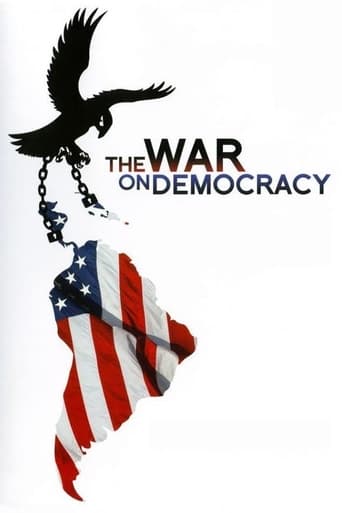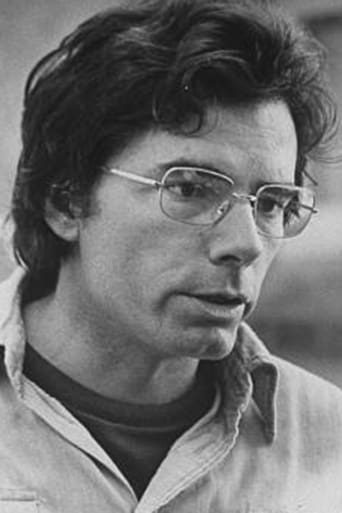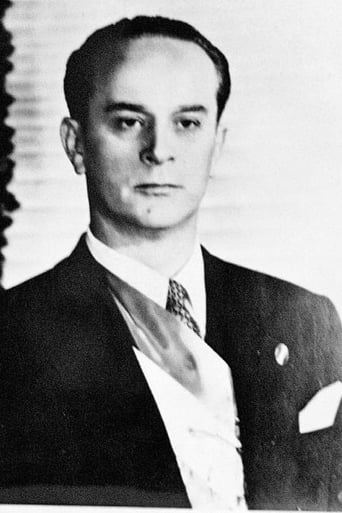The War on Democracy (2007)
Set both in Latin America and the United States, the film explores the historic and current relationship of Washington with countries such as Venezuela, Bolivia and Chile. Pilger says that the film "...tells a universal story... analysing and revealing, through vivid testimony, the story of great power behind its venerable myths. It allows us to understand the true nature of the so-called "war on terror". According to Pilger, the film’s message is that the greed and power of empire is not invincible and that people power is always the "seed beneath the snow".
Watch Trailer
Free Trial Channels
Cast


Reviews
an ambitious but ultimately ineffective debut endeavor.
Although I seem to have had higher expectations than I thought, the movie is super entertaining.
There are moments that feel comical, some horrific, and some downright inspiring but the tonal shifts hardly matter as the end results come to a film that's perfect for this time.
The joyful confection is coated in a sparkly gloss, bright enough to gleam from the darkest, most cynical corners.
The War on Democracy is a bit hard to follow, both because of some intense story and thanks to a somewhat confusing execution. The idea behind the work is that it is an examination of mostly-American backed efforts to undermine popular movements in nations throughout Latin America. It is no secret anywhere that the United States, like any major power in history, has intervened in foreign affairs in the name of its own national interests. In fact, Pilgir interviews a retired CIA agent who argues just that. The retired agent claims the USA did brutal things for what Washington would argue was a greater good. Many other individuals interviewed, especially those that suffered like an American nun who was tortured and raped by 1980's central American government squads, would argue that stability was and is not worth cruelty and death. Had Pilgir based his film on that argument and explored it much further (with more in-depth arguments on both sides), I would have doubled the number of stars despite his rather vocal and frankly preachy opinions and regardless of the the fact he delves no deeper in history than 1948. But he doesn't.Instead, Pilgir devotes the first half of his film to an overly rosy depiction of a modern politician, Hugo Chavez, and modern Caracas. After a while one may wonder of "South America" just means "Venezuela." Whether he is good or bad, Chavez is a modern politician and pushing him so hard so early does not help the film (a shorter explanation of the coup and counter-coup in 2002 would have worked better). Eventually, Pilgir does go into some history on American involvement in Guatemala and Chile, but hardly in any detail save for the tour of Pinochet's stadium turned torture chamber. He has a couple of very short and edited interviews cut against his own, much more explained, opinions. His perspective is inconsistent too. Chilean poor are written off because their government is friendly with the west, but Bolivian and Venezuelan poor are considered heroes because they are fighting the good fight against capitalism. Brazil, Argentina (which fought open war with Britain in the 1980s), Mexico (invaded by the USA in 1846, 1914, and 1916), and Colombia are all ignored save for ominous implications that the US supported non-democratic governments there at one time or another. There is no mention of historically vital points like the Monroe Doctrine and the Cold War is quickly dismissed as American paranoia. Even the still active and divisive issue of the drug wars is forgotten.Instead we get fuzzy camera lenses, a few sound bites from Fox News, quick cuts to what we are supposed to believe is either a brutal fascist scene (armed guys in fatigues) or an uplifting socialist one, heavy pull-on-heartstrings editing, and a frankly self-righteous and paternalistic tone that in some ways undermines the very people its trying to support by placing far more on their shoulders than they want or need. The poor of Latin America have been mistreated for centuries, by indigenous empires, Spain, Creole caudillos and juntas (which are common in Latin American History but never mentioned by Pilgir), Europe, and especially the USA, but I do not believe this film gives a good or even adequate account of that.
I do not wish to add more praise on my fellow-Australian than has been heaped on him so far, but it was great to see a well made documentary covering the way the US corporate empire tries as desperately to hang on to its satrapies as did the Roman and Ottoman empires.We had the unpleasant experience of having our popularly elected government led by Gough Whitlam destabilised by the CIA while at the same time they were backing Indonesia's illegal invasion of East Timor in which six Australian journalists were murdered. It turns out that the coup by which that Indonesian leader, Suharto, came to power was also orchestrated by the CIA, and thousands of Indonesians, especially ethnic Chinese, were slaughtered in the name of anti-Communism.It is by now well known that the casus belli for the war on the Vietnamese, the so-called Gulf of Tonkin incident, was a total fabrication, used to justify President Johnson's decision to reverse President Kennedy's plan to withdraw all troops from South Vietnam.There is plenty material here for The War on Democracy II if John wants to do a sequel.
John Pilger is a unique journalist with credentials to boot. I find this documentary very helpful in shining a light on otherwise ill reported topics. The only problem is that this title is unavailable in the United States just now. It is funny that all his documentaries aren't shown there. Some aren't shown here in the U.K. The idea that he is Anti-west as is touted by some very narrow minded people is absurd. I recommend watching this Documentary and many others of his like it. You will find he is not anti west, just anti corporate globalisation. That is a very important issue that is never covered by the mainstream media. This is the only reason that the other review here is condemning him. Watch with an open mind. With regards here is a quote of Jeanette winterson about history and information in a media frenzied world. "If you want to keep your own teeth, make your own sandwiches." The world needs more information like this. We are tomorrows people and the fact that the U.s, U.K (my own country) and many other huge corporate meccas ignore the rest of the world, creating this muddled up terror riddled nightmare, can only be settled, even a little, by people opening their minds and hearts to more than just their own comfy lifestyle. I not a conspiracy theorist, they should all be condemned. Freedom of information is essential for great journalism, journalism should publicise human beings (like us) being screwed in our name. This documentary is great. watch more like it. Well done again Mr Pilger. :)
A labor of love on the part of Pilger, a long-time activist for peace and freedom for all, Pilger journeys into several Latin American countries-Bolivia, Peru, Venezuela, and Chile, and documents efforts being made to broaden the accessibility of freedom. He documents the populism promulgated by leaders by Hugo Chavez and Evo Morales, the President of relatively poor Bolivia, to promote the values of true democracy, in which the poor are franchised and invested in the well-being of the country. Pilger talks to people who were adversely affected by CIA-backed coups in many of these same South and Central American countries during the second half of the 20th century, making a powerful witness to the deleterious effect of greed and the disproportionate allocation of power in the hands of a few. The work of the CIA on behalf of US corporately acceptable "leaders" is documented; much of this is not new, but Pilger's main accomplishment is collating and connecting the material on so many foreign interventions by the CIA.A wise cinematographic decision by Pilger is to interview and show the people of these nations. They appear decent and it is important for Westerners to realize that they have a lot in common with the so-called impoverished. Beneath our different exteriors, we share many characteristics. Also, the footage of the countries, and often just the day-to-day lives are lovely and the mountainous backdrops of Bolivia, Peru, and Chile, are beautiful. Pilger makes a strong case for government conducted on behalf of the people and interviews Chavez, allowing him to make his case for such a rule-of-law. Pilger interviews a couple of CIA sources, including the head of the CIA in South America during the mid-1980s. He asks him whether the ouster of Allende had been justified and the man states that the ends had to justify the means. He also said that US interests were protected via the installation of Pinochet, failing to recognize the contrast between US claims of respect for democratically elected governments and US intervention when the US, oh.....felt like it. Pilger's decision to refuse to interrupt while the man put his foot in his mouth and re-affirmed the importance of protecting US interests over even sovereign governments, seems wise. The man only seems all the more out-of-touch and arrogant for his unapologetic defense of autocracy. This is a powerful indictment of greed and of the possible benefits available to ALL if the US will allow sovereign governments to work autonomously. Notably, the film is available via Google Video for those interested.








